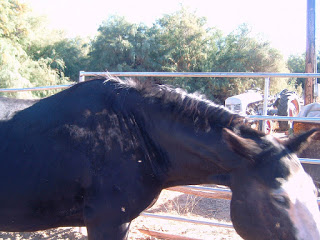If you notice that your horse or pony – no matter what his age – keeps rubbing frantically on fence posts or stable walls or rolling frequently, check for signs of sweet itch. This horrid Spring and summertime plague is caused by an allergic reaction to bites from midges (Cullicoides) and black fly (Simulium). These little nasties can be biting your horse right through the warm months from March to November when the weather turns cooler.
If you’re lucky your horse is only mildly allergic – scratching his tail area on a tree or fence post to relieve the annoying puritis skin condition that results from a midge or fly bite. In extreme cases however he will be driven crazy by the itching, rubbing and scratching on anything and everything available, causing himself skin trauma and suffering secondary infections, not to mention a high degree of suffering.
If you have a horse prone to Sweet Itch you’ll probably be at your wit’s end and suffering distress yourself because you want to bring him some sweet itch relief but not sure how.
SYMPTOMS OF SWEET ITCH
While the itchiness may be obvious, it’s best to first try to ascertain whether in fact your horse is itchy because of midge and fly bites and not some other allergic or skin condition. Be vigilant and investigate any signs of itchiness.
If the irritation and soreness is down to sweet itch the itchiness will be mainly concentrated on the neck, mane, under the belly and base of the tail, and your horse will be rubbing and biting at his skin. The affected areas will be lumpy, scaly, scurfy, inflamed and hot. In the early stages his coat will just look ruffled and rubbed up.

Young horses might develop the allergy at around four years of age, but it gets worse as he grows older and can end up affecting him all year round, not just seasonally.
Your horse might be restless and even start to lose weight, and there will be signs of self-trauma caused by biting and scratching. He’ll be more inclined to take any opportunity to cover himself in mud – a natural defence against biting insects.
If you notice any signs of possible skin puritis while grooming your horse, don’t delay – take appropriate action to have the condition diagnosed by a vet, and protect your horse from further harm.
Unfortunately there is little hope that blood tests will be able to show up allergies, but your vet should be able to test for known allergies and diagnose Sweet Itch if that is the case. There are other causes of irritating equine skin disease, such as ringworm, rainscald, lice, mange, and allergies to dust mites and pollen.
SWEET ITCH MANAGEMENT
It might seem almost impossible to protect your horse from fly and midge bites; even if stabled all the time the flies will find them, especially when they swarm most energetically at dawn and dusk.
There is no cure for Sweet Itch; there are, however, actions you can take and products you can use to bring some sweet itch relief for your horse.
Keep your horse away from watercourses and trees, where there biting insects are more prevalent.
Keep them in at dawn and dusk when insects are most active, under a ceiling fan installed in the stable to deter midges, which apparently can’t fly in wind speeds over 5mph.
Turn out on breezy, dry days.
Put a fly screen on the stable door.
Use insect repellents on your horse and his environment.
Invest in a fly rug, tailored to the severity of the horse’s symptoms. The worst affected animals will need to wear a fly rug all day and night, so make sure it is well fitted, comfortable and durable. Modern technology means that fly rugs will protect the body without over-heating your horse.
Why not try one of the latest fly rug fashions: zebra striped fly rugs aren’t just designed to look trendy, but the black and white stripes are believed to deter flies and biting insects from alighting on the fabric.
A fly mask is also essential – preferably one that covers the nose and ears (which will also protect your horse’s nose from sun burn). And don’t forget those vulnerable legs! Le Mieux have developed their Gladiator mesh fly boots for front or hind legs which are cool and comfortable while keeping flies – and ticks – at bay.
Anti-itch shampoos can be effective to relieve itching and moisturising shampoos ease dry skin. Most are also formulated to be anti-bacterial and give your horse a fresh, cool boost.
There are all sorts of dietary supplements available for horses prone to sweet itch to improve skin condition and specifically combat itchiness. Some natural herbal formulations, like Global Herbs Fly Free Powder work from the inside out to make the horse’s skin unpalatable to pests.
We’d encourage you to work with your vet on preventative measures, sweet itch relief and treating any flare ups to make your Sweet Itch sufferer as comfortable as possible! We’re here to help, too … talk to us at Totally Tack if you are having difficulty managing your sweet, itchy horse or pony.



